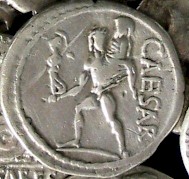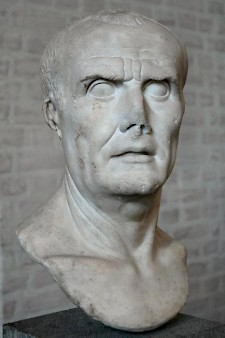Julia (1)
Julia (c.130/125-68 BCE): wife of the Roman commander and statesman Marius, aunt of Julius Caesar, the dictator.

Julia was probably the daughter of a Roman senator named Sextus Julius Caesar, and therefore belonged to an ancient, patrician family which had, however, lost much of its influence.
The old Roman republic was, at this moment, in a process of transformation. A politician named Scipio Aemilianus had changed the rules of the political game, and after this, the agricultural and political reforms of Tiberius and Gaius Sempronius Gracchus had taken away many old certainties. There was room for new politicians, like the influential Gaius Marius, a war hero who had made his fortune in Spain. Like so many "new men", he sought respectability through a marriage with an aristocratic lady; and like so many impoverished aristocratic families, the Julii renewed their influence by marrying "new money".
The marriage took place in c.110 BCE, although an earlier date cannot be excluded. The couple had a son, who was also called Gaius Marius.

The career of the elder Marius was spectacular: in 107, he obtained the consulship; in 105, he defeated the Numidian king Jugurtha; he reformed the army; and he defeated the Germanic tribes of the Cimbri and Teutoni. For some time, he was the leading man in Rome, and Julia's relatives seem to have benefited:
- Lucius Julius Caesar was praetor in 94, consul in 90, and censor in 89;
- Gaius Julius Caesar Strabo was aedile in 90;
- her brother Gaius Julius Caesar was quaestor in 99, praetor in 92, and governor of Asia in 91.
In 88, a large war broke out: the First Mithridatic War, against king Mithridates VI of Pontus. Marius wanted to have the supreme command, but the Senate preferred a younger general named Sulla. The rift between the two men was deep and divided Roman political life as never before. Of the three members of the Julius family listed above, the first two sided with Sulla (this party was called the optimates), the third one with Marius (leader of the populares). While Sulla was away, Marius and a politician named Lucius Cornelius Cinna staged a coup d'état, but Marius died immediately after he had obtained his seventh consulship in 86. Julia was now a widow.
In 82, Sulla returned from the war and staged a counter-coup. During the fights, Gaius Marius Junior, now consul, was killed.
Sulla reorganized the state, and partisans of Marius fell into disfavor. However, in 70, the consuls Pompey and Crassus revoked Sulla's measures. Two years later, Julia died; her funeral oration was held by quaestor Gaius Julius Caesar, the son of Julia's brother, who used the occasion to praise Marius and claim his legacy. It was the beginning of a spectacular career.